Dental Implants Asheville
Regain the Complete, Confident Smile You Deserve

Today, dental implants in Asheville are the ideal solution for replacing gaps in a patient’s smile. They replicate the entire structure of missing teeth, including the roots which lay hidden below the gum tissue and hold the teeth in place. By mimicking nature’s original design, Dr. John White can preserve your oral health while also providing a natural-looking tooth replacement solution that makes you feel like smiling more often. The best way to learn whether you’re a good candidate for this modern procedure is to contact our office today to schedule an initial consultation. Our team will be more than happy to answer any questions you may have and walk you through the entire process, so you know exactly what to expect.

Why Choose Dr. John White, DDS For Dental Implants?
- Start-to-Finish Dental Implant Treatment All Under One Roof
- Permanently Replace Any Number of Missing Teeth
- Dental Insurance Welcome & Flexible Financing Available
What Are Dental Implants?

Dental implants are small, titanium posts that can be placed beneath the gumline where a missing tooth once was. The material that they’re made of is completely biocompatible, allowing them to fuse with your jawbone through a process called osseointegration. Essentially, this replaces the roots of the missing teeth, which is what sets dental implants apart from other tooth replacement options. Dental implants are the only option that stimulates blood flow in the jawbone like the roots of natural teeth, preserving its density and keeping it from deteriorating over time. One or more implants can be used to support a crown, bridge, or denture, allowing them to replace any number of missing teeth. These custom-made restorations are carefully designed to blend in seamlessly with the rest of your pearly whites. When you rebuild your missing teeth from the roots up, you get a smile that looks, feels, and functions just like natural!
The 4-Step Dental Implant Process

Unlike traditional dentures or bridges, dental implants require a unique process that involves multiple steps that span over several months. This may seem like a long time, however, it’s exactly what allows you to enjoy this tooth replacement for decades to come. Dr. John White proudly completes the entire treatment at this convenient office, including implant surgery and placement. While each treatment is different, you can expect to follow these 4 main steps for how dental implants work in Asheville.
Initial Dental Implant Consultation

First, Dr. White will review your medical history and examine your oral health. Most people who have lost one or more teeth are good candidates for dental implants as long as they are committed to stellar dental hygiene. If needed, Dr. White will perform preparatory treatments like gum disease therapy, bone grafting, or tooth extractions. These services are a vital part of what makes dental implants so successful. Once these preliminary producers are complete, you’ll be ready for treatment planning, which includes important information like the timeline and cost of your dental implants.
Dental Implant Surgery
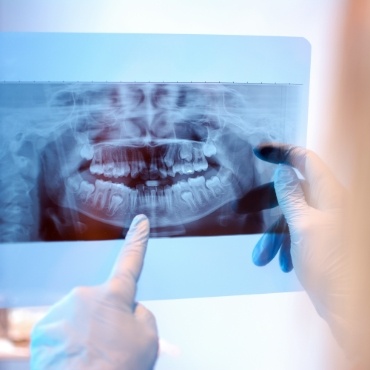
Unlike many other dentists, we provide implant surgery in-house. This means more convenience, simpler, more compact fees, ultimate comfort, and total peace of mind. First, Dr. White will ensure that your mouth is numb and that you feel relaxed. We also offer sedation for a greater sense of comfort. Then, Dr. White will create a small incision in the gums for the placement of dental implants. Once they’re placed, your gums are closed, and a temporary cap will protect the implant.
Dental Implant Osseointegration & Abutment Placement
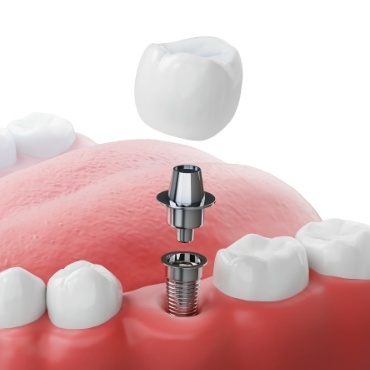
Once your dental implants in Asheville are placed, you’ll begin a healing process called osseointegration. Dental implants are made of biocompatible materials that allow them to fuse to the jawbone, becoming a permanent part of the body. This is exactly what allows dental implants to provide so many benefits, including strength and a lifelike appearance. Osseointegration usually takes between 3 to 6 months. Once your implants are completely healed, you’ll come back into our office for a minor treatment. Dr. White will place abutments, which are small connectors that allow him to connect your restorations to the implants.
Delivery of Dental Implant Restorations

Lastly, you’ll return to our office for a final appointment with our implant dentist in Asheville. The type of restoration we provide you with will depend directly on the number of teeth that you’re missing (it could be a crown, bridge, or denture). Dr. White will place your restorations and ensure that you’re happy with them. He will see that your bite is comfortable and feels comfortable before you leave. Then, all that’s left to do is to leave our office with your newly rebuilt smile!
Benefits of Dental Implants

Dental implants in Asheville are such a popular tooth replacement choice for patients because they offer a variety of unique benefits that you simply can’t get with dentures or dental bridges. Due to their precise placement in the jawbone, dental implants have the potential to dramatically improve your confidence, health, and quality of life. Read more to learn how.
Day-to-Day Benefits

You use your teeth for eating, speaking, and smiling. Here are some of the benefits that you can experience every single day with dental implants:
- Versatility: Dental implants can be used to replace any number of missing teeth, and they can be used to support numerous types of restorations. No matter what your tooth loss story is, dental implants may be able to help.
- Efficiency: An entire arch of missing teeth can be placed with anywhere from four to six dental implants. A bridge or partial denture can be supported with just two implants.
- Maintenance: It is as easy to care for dental implants as it is for natural teeth. Great oral hygiene and regular dental checkups help to keep your restored smile in beautiful shape.
- Confidence: No one wants to deal with tooth replacements that shift around or slip out of place. Dental implants remain anchored in the jawbone, allowing for a sturdy smile.
Health Benefits

In addition to improving your appearance, dental implants have a variety of health benefits. Here are some of the most prominent:
- Nutrition: With additional stability, it is much easier to thoroughly chew the nutritious foods you need to thrive.
- Strong Jawbone: Dental implants act as tooth roots, so they stimulate the jawbone when you chew. This helps to prevent jawbone deterioration from occurring over time.
- Oral Health: By replacing missing teeth with dental implants, you can prevent your other teeth from shifting around and causing issues.
Long-Term Benefits

The benefits you feel right away are great, but they don’t stop there! Here are some of the pros that you can experience many years down the road:
- Successful: Dental implants have an impressive success rate of over 95%!
- Youthful Appearance: Replacing missing teeth with dental implants can take years or even decades off your appearance.
- Long-Lasting: With proper maintenance, dental implants can last upwards of three decades!
Who Dental Implants Can Help

During your initial consultation, Dr. White will develop an individualized treatment plan to achieve exquisite results. Dental implants are a versatile tooth replacement option, allowing him to offer this solution for any pattern of tooth loss. Almost anyone can get dental implants, and after your initial appointment, Dr. White will create a custom treatment to match your specific needs.
Who Is a Good Candidate for Dental Implants?
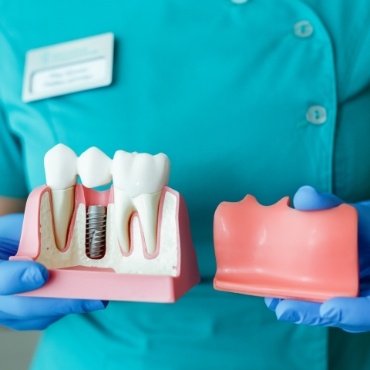
Most adults can get dental implants, which is one of the reasons why they’re so popular. However, you must usually have these 3 things to be considered a good candidate for this treatment:
- Good overall health: Dental implants require a minor surgical procedure, so you must be well enough to undergo a small surgery.
- Great oral health: Issues like gum disease and tooth decay can compromise the success of your dental implants, which is why we must address these issues before getting started.
- Adequate jawbone health: Your jawbone must be strong enough for the placement of dental implants for the treatment to be successful.
Even if it doesn’t sound like dental implants are right for you, our dental implant dentist in Asheville can provide services like bone grafting, tooth extractions, and gum disease therapy to get your smile back on track. After these preliminary treatments, we’ll be able to develop a custom plan based on the number of teeth that you’re missing.
Missing 1 Tooth
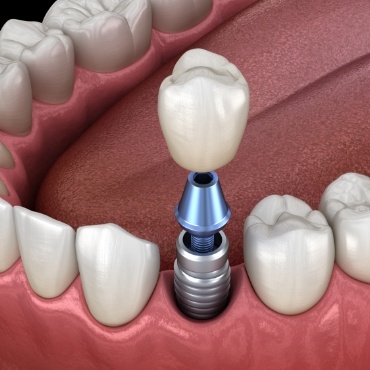
For a single gap in your smile, Dr. White can place one dental implant and attach a customized crown to the top of it. This will prevent the surrounding natural teeth from drifting out of place and creating orthodontic issues down the road. A single tooth implant is not only stronger and longer lasting than a traditional bridge, but it doesn’t require the altering of neighboring healthy teeth as well!
Missing Multiple Teeth
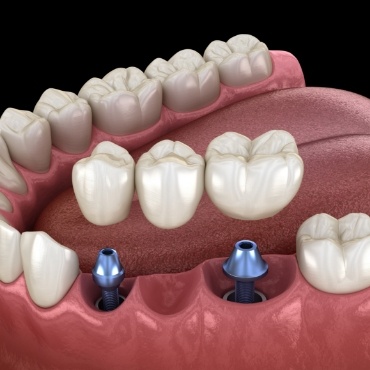
Traditional bridges require the alteration of your natural teeth to sustain your replacement teeth. With an implant bridge, Dr. White can anchor your replacement teeth without affecting your natural ones by using as few as two dental implants in Asheville. This is a perfect solution if you’re missing teeth consecutively. For many missing teeth throughout the mouth, multiple dental implants can anchor a partial denture in place to restore your appearance and biting power.
Missing All Teeth
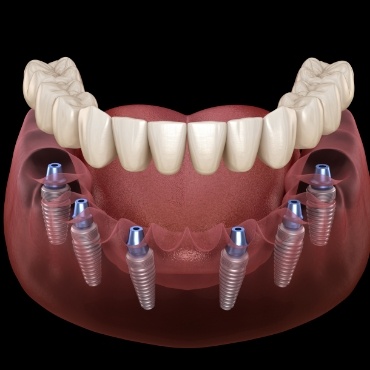
Whether you’re missing an entire arch or all of your teeth, our team can replace them with implant dentures. After placing anywhere from four to eight dental implants, we’ll be able to secure an entire arch of customized, natural-looking replacement teeth in your mouth. This combines the best of both worlds, giving you the beautiful appearance that dentures provide while also allowing you to enjoy a strong, natural-feeling set of teeth. Implant dentures are firmly rooted in the jawbone, so they don’t slip and slide around like traditional ones.
Mini Dental Implants

While standard dental implants are an excellent choice for most patients, they’re not right for everyone. For example, those with extensive tooth loss or who have been missing teeth for quite some time most likely won’t have enough jawbone density to support standard dental implants. While you could potentially get a bone graft to strengthen your jaw, Dr. White offers an alternative: mini dental implants.
As their name implies, mini dental implants are smaller than standard dental implants. Therefore, they require less jawbone density and a less extensive procedure to place. What’s more, they can dramatically reduce how long it will take to get dental implants, allowing you to skip preliminary bone grafts, have your restorations placed sooner, and enjoy a shorter healing period. If you’re interested in mini dental implants, keep reading or give us a call today!
What Are Mini Dental Implants?
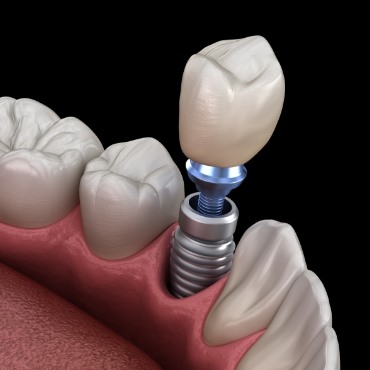
Mini dental implants are typically used to anchor implant dentures in place. They are a small titanium implant that serves as a new tooth root when implanted into your jawbone. Unlike a standard post, they have a retaining fixture attached to them. This eliminates the need for separate abutments when securing your denture.
The head of the post is shaped like a ball which connects to a socket that features a rubber O-ring at the base of the denture. This allows the denture to snap over the ball to secure it to your jawbone. The denture rests on the gum tissue to restore your ability to chew, speak, and smile without needing to worry about any slipping or irritation.
The Process of Getting Mini Dental Implants
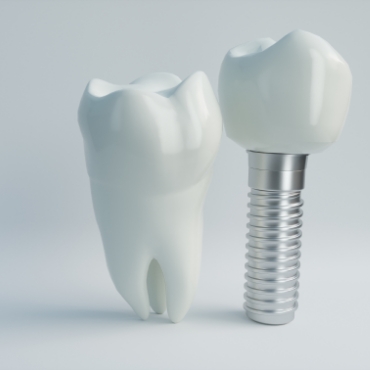
Because of the smaller size of the implants, the surgical procedure is less invasive and rarely requires bone grafts. In most cases, even reduced jawbone structure can support mini dental implants successfully.
The process to place mini dental implants is often quicker than standard options. Your implant dentist in Asheville, Dr. White, uses a local anesthetic or light sedation to ensure your comfort. Then, they are placed into your jawbone like a standard dental implant placement. However, the top part stays exposed above the gumline so that the denture can be placed right away. This allows you to enjoy a one-step procedure that is minimally invasive and has a shorter recovery time.
The Benefits of Mini Dental Implants

Since mini dental implant posts are smaller, you can enjoy several benefits alongside the normal advantages of dental implants, like:
- Skip preliminary treatments like bone grafting.
- Less invasive placement surgery.
- Faster and more comfortable healing period.
- Protects your facial structures.
- High success rate.
A Smaller, Reliable Solution

Although they are smaller than traditional solutions, mini dental implants are built to withstand daily wear and tear. The risk of failure under ordinary chewing forces is rare, so you can experience greater peace of mind knowing that your new smile will last. You will enjoy a reliable, tight, and comfortable-fitting system to hold your denture in place.
Mini dental implants are FDA-approved based on their success in both clinical and technical research. They are deemed safe for public use to promote dental health as a long-term solution.
Understanding the Cost of Dental Implants

Dental implants allow you to make a lifelong investment in your oral health and quality of life. Although they can have a higher up-front cost than traditional solutions, they are more affordable in the long run. When determining how much you can expect to pay, there are several factors you must consider, such as how many teeth you are replacing and the materials that are used. During your consultation, we provide you with an estimate based on your treatment plan and discuss your payment options. Read on as we go over what factors will influence the cost of your dental implants and how you can make them affordable.
Number of Teeth Being Replaced
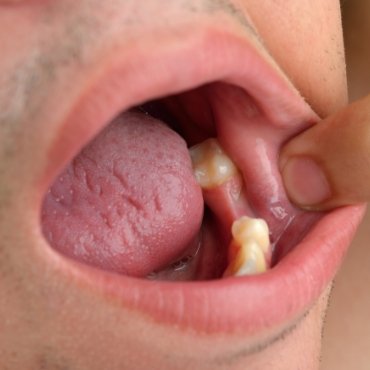
A single-unit implant is more affordable than an implant bridge or denture. However, these options are more affordable than replacing several or many missing teeth individually. The types of posts and abutments used also affect the price, as well as whether your treatment should involve traditional implants or mini dental implants.
Materials for Your Dental Implants
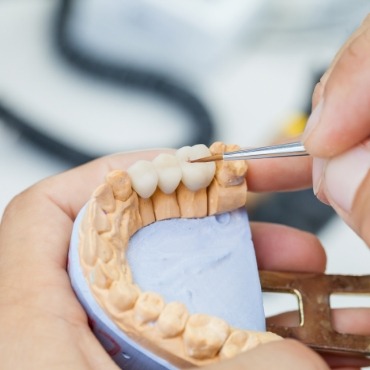
There are discounted materials available to help lower the cost, but practices using these inferior materials could compromise the long-term success of your smile. In our practice, we use only the best quality materials from the most well-known dental implant companies. We want only the best for our patients!
Additional Costs
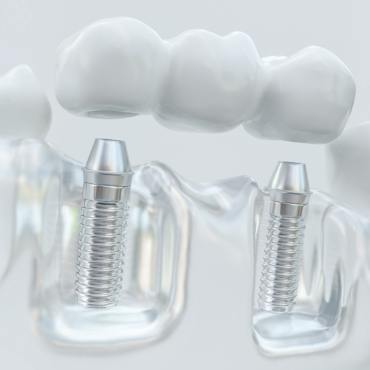
It is not uncommon to need additional procedures before the placement of your implant posts, like tooth extractions, bone grafting, or a sinus lift, which will naturally increase the overall cost of your treatment. Plus, the dental implant surgery itself will incur a cost of its own, as will the use of any sedation or anesthesia.
Paying for Dental Implants

To help lower the cost of the treatment, your dentist in Asheville maximizes the value of your insurance policy. Although it will likely not pay for the entire procedure, it can usually be used for certain aspects of your treatment, such as tooth extractions or your restorations until you meet your annual allowance.
To cover an out-of-pocket expense, CareCredit is also available. Based on credit approval, you are given the funds to pay for your treatment. You then repay the balance using a payment plan that accommodates your budget.
Dental Implant Post-Op Instructions

Dr. White can complete the entire dental implant process from start-to-finish in the comfort of our own office. You will be given specific post-op instructions after your procedure to help you recover with ease. Continue reading to learn more about what you can expect from the healing process and when you should contact our office.
What to Do Directly After Dental Implant Surgery

While you may not necessarily be looking forward to the procedure itself, by taking all the proper steps immediately afterward, you can make the healing process much quicker and more pleasant. Your biggest priority is to leave the forming blood clot untouched so that healing happens smoothly. Be sure that you are in accordance with the following:
- Do not spit – Instead, use tissues or swallow saliva.
- Do not use drinking straws.
- Do not smoke for at least the first day.
- Do your best to keep your tongue (and fingers) away from the surgical site.
Common Side-Effects When Recovering from Dental Implant Placement

It is normal to experience some mild side-effects in the first few days after dental implant placement surgery. Here are some of the most common ones that you may experience:
- Bleeding: Intermittent bleeding is normal right after surgery. This can be lessened by using gauze and light pressure. This should subside after a few days.
- Swelling: Swelling is often present for the first 72 hours after surgery, but sometimes, it can last over a week. Cold compresses can help to reduce this.
- Soreness: It’s normal for the area to feel sore for a few days. This can be managed by taking pain relievers as directed.
All of these side effects should be temporary, but if they are extreme or persist, give us a call so we can help!
Your Diet After Dental Implant Surgery

It is very important to be mindful of what you are eating for a few days following your surgery. Here are some foods that we typically recommend for patients until they are able to return to their normal diets:
- Mashed potatoes
- Yogurt
- Ice cream
- Pudding
- Soup
- Scrambled eggs
- Pasta
Once your discomfort subsides, you can switch back to your normal diet. Just remember to avoid chewing directly on the implant surgery site.
Post-Op Health & Oral Hygiene

It’s crucial that you keep your smile clean after your surgery. This way, the implants will have a better chance of integrating with your jawbone successfully. Here are some tips to help:
- Brush your teeth normally the day after surgery but remember to be especially careful near surgical sites.
- Rinse your mouth two or three times each day with saltwater. Use a prescription mouth rinse if you have one.
- Avoid mouthwashes that contain high levels of alcohol.
What to Do After Your New Teeth Are Attached

Once you’re all healed and the implants have fused with your jawbone, the hard part is over! When your new crown, bridge, or denture is attached to the implant(s), you might experience some temporary, mild sensitivity, but this is easy to control with over-the-counter pain relievers. There shouldn’t be any bleeding, swelling, or extensive recovery. At this point, you’re all set!
Dental Implant FAQs
Can I Get Dental Implants If I Have Gum Disease?
Gum disease is preventable, but it’s the leading cause of tooth loss in the U.S. If you’ve lost one or more teeth from gum disease, you won’t be a candidate for dental implants until after the infection has been resolved. Periodontal therapy will provide the healthy foundation your new smile needs to thrive. In some cases, you may also need additional procedures to repair any damage caused by gum disease, like bone grafting. You’ll need to be proactive about your oral hygiene after your placement surgery to prevent the infection from reoccurring, which could cause your implant to fail.
Does Getting Dental Implants Hurt?
During your placement surgery, sedation or anesthesia is used to ensure you’re comfortable. You shouldn’t feel any discomfort; however, you will be a bit sore for a few days while you recover. You can manage this with an over-the-counter pain reliever. After you’ve healed, you shouldn’t experience any pain. If discomfort occurs, it can be a sign of dental implant failure, so it’s best to contact our office right away to save your smile. Pain, redness, and swelling are early signs of dental implant failure, but quick intervention can restore a healthy smile.
Will I Need Bone Grafting to Get Dental Implants?
Many patients who are interested in dental implants will also need bone grafting, but it isn’t always necessary. During your initial consultation, we’ll review a CT scan of your jaw to ensure it is strong enough to support your dental implants. If you don’t have enough jawbone density, we will recommend bone grafting to enhance the thickness of your jaw. Although it adds another step to your plan, it’s essential to ensure your dental implants have a stable foundation.
Does Dental Insurance Cover Dental Implants?
Every policy differs, but many dental insurance plans will cover a portion of the cost after reaching your annual deductible. You are given a yearly allowance to help offset the expense of certain steps in your treatment, like the consultation, periodontal therapy, or your restoration. Our office will work on your behalf with your insurance carrier to maximize your benefits to lower the amount you need to pay out-of-pocket. Our office accepts many payment forms for any remaining balance, like third-party financing. We will help you find the solutions you need to replace your missing teeth without worrying about draining your wallet.
Maintaining & Caring for Your Dental Implants

Dental implants can last for a lifetime with the right aftercare, like committing to your oral hygiene at home and protecting your new smile from any damage. Regular appointments with your dentist are equally important to safeguard your dental implants from any complications. With the right care, you’ll enjoy lasting results, so you’ll never need to worry about having your dental implants replaced.
Dental implants are an excellent long-term investment in your smile. They are the most reliable solution to treat tooth loss because they offer predictable, long-lasting results. In fact, you can easily expect your dental implants to last 30 years or more with the right care! Don’t worry, you don’t need a lengthy routine with lots of extra dental care products to enjoy your dental implants for life. Here’s how to preserve your new smile.
Make Oral Hygiene a Priority

The biggest threat to the overall success of dental implants is a preventable infection called peri-implantitis, which is like gum disease. You can keep this infection at bay by committing to your oral hygiene routine at home. It’s best to use a soft-bristled toothbrush and nonabrasive toothpaste to clean your teeth at least twice daily to remove food particles and bacteria. Clean all surfaces of any natural teeth and your dental implants for at least two minutes each session. To remove plaque from any areas missed by your toothbrush, use high-quality floss to clean in between each tooth and around the dental implants every night before going to bed.
Protect Your Dental Implants

Your dental implants are durable enough to withstand the pressure of regular biting and chewing; however, they aren’t indestructible. It’s best to protect them from any potential damage by wearing an athletic mouthguard if you play sports. For patients who have bruxism, a nightguard can be used to provide a cushion between the upper and lower teeth to reduce the pressure of grinding and clenching. We also recommend avoiding using your teeth as tools and not chewing on any inedible objects, like your fingernails or pencils.
Schedule Regular Dental Checkups

Besides caring for your dental implants at home, you’ll also need to come visit us at least twice a year for routine cleanings and checkups. Your dental hygienist will remove any plaque or tartar accumulations that can infect the gingival tissue. Dr. White will conduct a thorough examination to ensure your dental implants are undamaged and functioning as intended. He will also look for any concerning issues, like inflammation of the gum tissue. If you develop any signs of dental implant failure in between your regular appointments, don’t hesitate to contact our office, like pain or redness.
